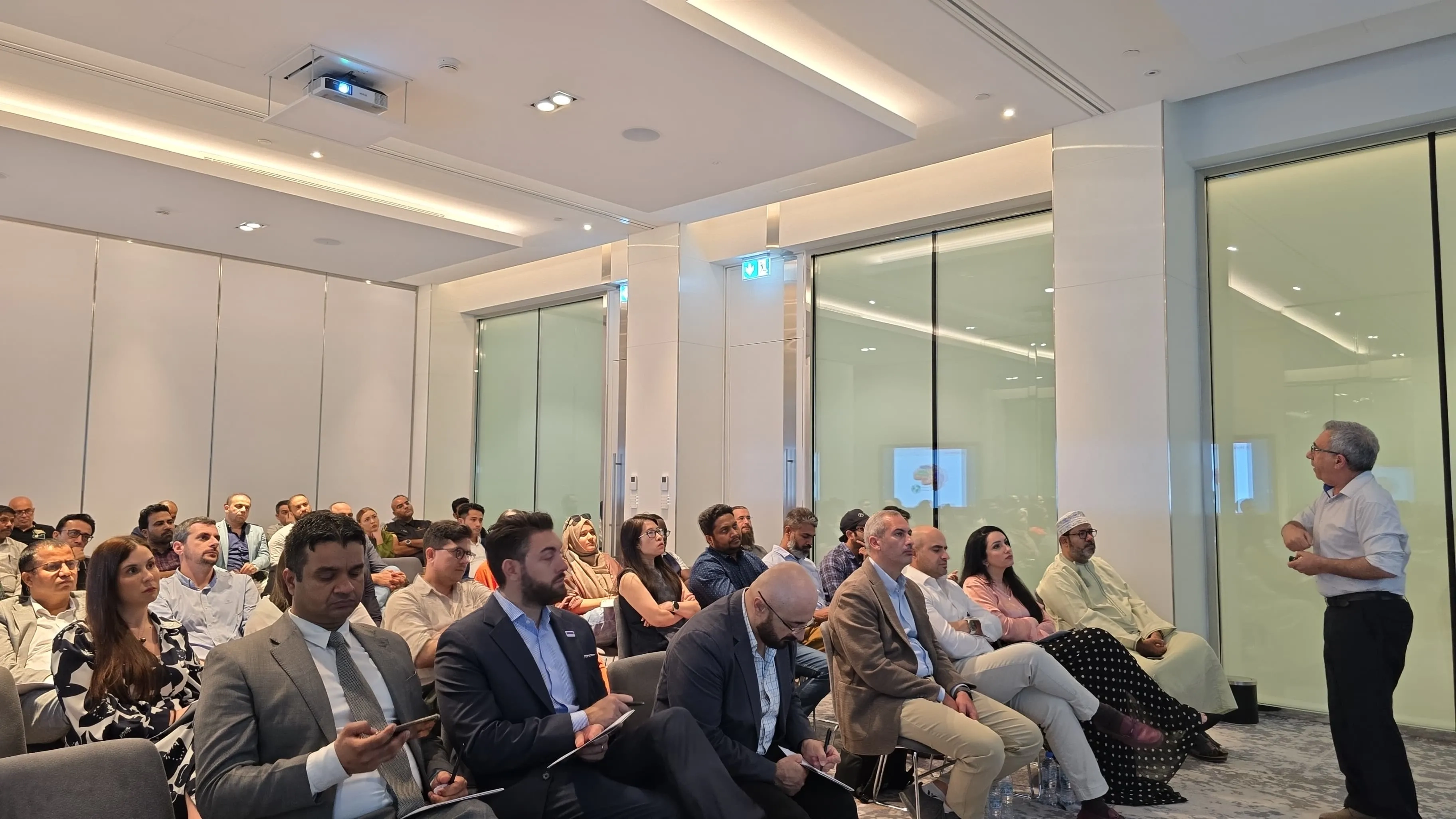
Dr Reza Salehneiad, Senior Lecturer (Associate Professor) in Economics & Strategy at Alliance Manchester Business School, has delivered a masterclass for students, alumni and guests, covering the potential future role of generative AI as a trusted advisor to business leadership, in the areas of strategy and business model innovation, improving ideation, prediction and decision making and, ultimately, business performance. Dr Reza drew comparisons with the UK government, where ministers (sometimes without specialist knowledge or experience) lead major government departments with the support and advice of specialist experts.
In his Masterclass, Dr Reza explored leadership in the age of AI, moving across a review of AI technologies, the critical role of decisions, the anatomy of predictions, and then key examples of applications. He also covered the transformation of human capital and firm performance.
He started with a question: With today’s emerging capabilities, what will management and organisational leadership look like in in the next 10-20 years' time? He explained that in the UK, most of the government ministers don't have the expertise in the field that they are leading. For example, you may have a person in charge of finance in the UK government who may never have studied finance or economics. The politician minister leads administratively but around them, you have the permanent civil servants who have the expertise.
In the business context, there is the CEO at the top of the leadership team and who possibly doesn't have market knowledge but he or she has experts around to give advice. So, the model here is exactly the way that the UK government runs.
“This model of a central general administrative leadership figure, surrounded by experts is the model I’m advocating today. So, as you can see, we have those who are leading the path but next to them, you have someone from a different type of background, and that's the ‘robot’. So, the kind of AI that I'm going to focus on is the recent generation of AI. It's the digital technology most of us have used in one way or another - generative AI.
“What we have basically found over the last 40 years is that human language is a complex thing. It's not a way of speaking. It's more than that. It actually captures the way we think in science, in maths, in physics, the way that we think about the world. So, by learning to create language, by learning human, basically, natural language, the AI system has developed a view, a theory, about the world. And uses that theory to predict. That's the essence. That's the essence of what has been done in terms of technicality.
“And this is one of the findings that many researchers think, after electricity, is possibly the most important human discovery. That we have come up with an AI system, that they learn human language, natural language, but by learning natural language, they learn how humans think about the market and the economy. So, we have a system that actually captures the knowledge implicit in the language. The last point that has emerged, and no one knew five or six years ago, is this: when you start training this AI model, and you add more and more data, these models develop new capabilities.”
Dr Reza outlined the capability of the AI system – that they understand language, can translate and can recognise the patterns in the data. “So, the question that I'm basically discussing with the class is this. Imagine you have an AI system and that AI system, by learning the structure of natural language, the way we speak with each other, by learning the structure, it has learned all scientific theories in math, statistics, business, and finance. How can such a system help and assist a CEO, managers, and others in the business field? That's the question that we have.
Dr Reza went on to examine generative AI’s potential roles in ideation, creating and automating business model innovation alongside a CEO, product development, and predicting competitive company investment decisions based on historical and current published data. If AI can create ideas in a minute, what does this kind of capability mean? It suggests that what is becoming increasingly important in the new economy is the ability to join-up ideas, based on human experience.
Generative AI models can be used to extract valuable, interpretable information about corporate policies that are not otherwise available to managers and can provide a cost-effective way to arrive at better decisions. These insights and predictions, can inform managerial thinking /decisions in many ways, including understanding rival’s strategies, identifying investment opportunities, predicting future competition, and predicting future potential technological disruptions.
Better predictions improve decisions – whether taken by labour (humans) or capital (machine) – by enabling more nuanced decisions through the reduction of uncertainty. Better decisions improve firm productivity, enabling growth and more effectively competing in the market.
He sounded a note of caution, highlighting that, despite their potential, generative AI tools still face challenges in real-world applications. At a technical level, popular LLM-based tools, such as ChatGPT, have been shown to produce false or misleading information in unpredictable ways, generating concern about their ability to be reliable in high-stakes situations. While LLM models often perform well on specific tasks, the types of problem that managers encounter in real-world settings might be broader and less predictable.
Dr Reza then ended with an optimistic message. “The beauty of these technologies is they are scalable, there is no limit and there is no barrier to accessing these technologies.”
